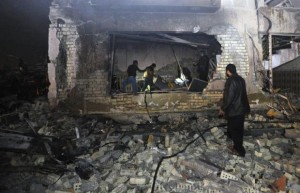Death toll in Iraq bombing claimed by IS rises to 73

Civilians search for survivors in the rubble at the scene of a car bomb attack near the city of Hilla about 95 kilometers (60 miles) south of Baghdad, Iraq, Thursday, Nov. 24, 2016. A car bomb tore through a gas station on Thursday, killing and wounding scores of people, including 20 Iranians Shiite pilgrims, in an attack claimed by the Islamic State group. —HADI MIZBAN/AP
MOSUL, Iraq — The death toll from a car bombing south of Baghdad claimed by the Islamic State group rose to 73 on Friday, including about 40 Iranian pilgrims, as Iraqi forces fought house to house to dislodge the extremist group from the northern city of Mosul in a five-week-old campaign slowed down by stiff IS resistance and fears of massive civilian casualties.
Iraqi police and hospital officials said 65 other people were wounded in the Thursday night attack at a gas station on a major highway near the city of Hilla, about 95 kilometers (60 miles) south of the Iraqi capital.
It was the deadliest IS attack in Iraq since July, when a car bomb killed about 300 in a commercial district in Baghdad.
IS claimed the attack in a brief statement on its Aamaq media arm, saying it was a suicide truck bomb. Earlier, Iraqi officials, who spoke on condition of anonymity because they were not authorized to talk to the media, had put the death toll at 56.
In Mosul, where an Iraqi government campaign to retake the city began last month, fighting continued in the eastern sector on Friday, with Iraqi special forces seizing another neighborhood, Masaref, and advancing in the densely populated Zohour district, according to Brig. Gen. Haider Fadhil. The offensive to capture Zohour began earlier this week, but troops are facing spirited IS resistance, he added.
Article continues after this advertisementThe sound of automatic fire and the thud of mortar shells and artillery shook the city’s eastern sector, east of the Tigris River, the whole day on Friday. An Associated Press team in the area said civilians fleeing the fighting continued to flow out of the inner parts of the city toward the lines of the Iraqi military.
Article continues after this advertisementOff the back of a truck, soldiers offered them rice, potatoes and tomato sauce. In the Bakr neighborhood, civilians lined the streets. Old and young men looked on silently, while children smiled and waved to the troops.
Lt. Col. Ali Hussein of the special forces in the Bakr neighborhood said his men were approached by three IS drones on Friday, of which they shot down two. He showed the AP team the wreckage of one. The drones were not armed, only carrying reconnaissance cameras, he added.
“It was a big push, in two weeks they’d only sent three others against us,” he said of the drones.
Hussein spoke with several of the civilians fleeing their homes, offered them water and heard local grievances from elders. He also distributed medicine and food.
Thursday’s attack south of Baghdad appears to have targeted a bus carrying Iranian pilgrims heading home after a major Shiite religious observance in the holy city of Karbala.
Iran’s Deputy Foreign Minister Hassan Qashqavi was quoted by the semi-official Tasnim news agency on Thursday night as saying that 80 people were killed, including 40 Iranians. Conflicting death tolls are common in the aftermath of large attacks.
The attack came a day after some dozen small-scale bombings in and around Baghdad killed 31 people and wounded more than a 100 — a particularly bloody day even by the standards of the Iraqi capital, which has for more than a decade endured near-daily violence blamed on IS or its forerunner, al-Qaida in Iraq, and which mostly targeted members of Iraq’s Shiite majority.
The gas station bombing underlined the continuing ability of IS to stage high-profile terror attacks even as the massive Iraqi military operation is underway in Mosul, the last major urban stronghold in Iraq held by IS. The offensive is aided by volunteer militiamen and the U.S.-led coalition, which has mostly been pounding IS targets in Mosul with airstrikes.
Moreover, Thursday’s IS bombing took place in Iraq’s Shiite hinterland south of Baghdad, a region that has largely been spared the near-daily violence that has for years engulfed the capital and Sunni regions.
Earlier this week, Prime Minister Haider al-Abadi visited Karbala, where he lavishly praised the country’s security forces for protecting the pilgrims against attacks by IS.
Extremist Sunni militants, including the Islamic State group, view Shiites as heretics and routinely target Iranian pilgrims who visit Iraq by the hundreds of thousands to pay homage to major Shiite shrines in Baghdad, and also the Shiite holy cities of Karbala and Najaf, south of Baghdad, and Samarra, to the north of the capital.
Shiite Iran is a major backer of the governments in Iraq and neighboring Syria in their fight against IS, providing military advisers and weapons.
“Let the vile Rafidha (Shiites) know that what awaits them in the near future, God willing, will be more painful and bitter and that the flames of the battles in Nineveh will reach them in Baghdad, Karbala and Najaf,” IS said in its statement.
Nineveh is the northern Iraqi province where Mosul is the capital.
The Shiite observance in Karbala, called the al-Arbaeen, routinely attracts hundreds of thousands of pilgrims, including many Iranians who travel overland into Iraq for the occasion. Several members of Iranian civil defense staff who had been in Karbala to offer assistance to Iranian pilgrims rushed to the gas station following the bombing, helping their Iraqi counterparts collect victims’ bodies and aiding the wounded. Iranian civil defense personnel typically accompany pilgrims on such trips to Iraq.